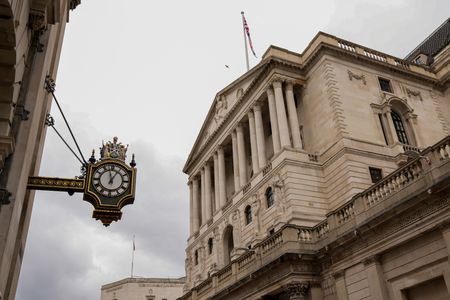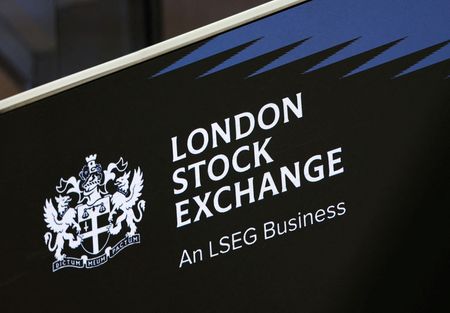By Stefania Spezzati, Jesús Aguado and Lawrence White
LONDON (Reuters) -The Bank of England has asked some lenders to test their resilience to potential U.S. dollar shocks, three sources said, the latest sign of how the Trump administration’s policies are eroding trust in the U.S. as a bedrock of financial stability.
As the leading currency for global trade and capital flows, the U.S. dollar is the lifeblood of global finance.
However, President Donald Trump’s break from long-standing U.S. policy in areas such as free trade and defence has forced policymakers to consider whether the emergency provision of dollars in times of financial stress can still be relied on.
While the U.S. Federal Reserve has said that the central bank wants to continue to make dollars available in the financial system, Trump’s policy shifts have prompted European allies to reexamine their dependence on Washington.
Following similar demands from European supervisors, the Bank of England, which oversees banks in the City of London financial hub, has requested that some lenders assess their dollar funding plans and the degree to which they depend on the U.S. currency, including for short term needs, one of the people with direct knowledge told Reuters.
In one instance, a global bank based in Britain was asked in recent weeks to run stress tests internally, including scenarios where the U.S.-dollar swap market could dry up entirely, another of the sources said.
“This reflects a new paradigm where trust in international cooperation appears to be breaking,” said John Cronin, analyst at SeaPoint Insights.
The BoE’s supervisory arm, the Prudential Regulation Authority, made the requests individually to some of the banks, the person with knowledge of the matter added.
All of the people familiar with the supervisor’s requests asked to remain anonymous because the discussions with the BoE are private.
A spokesperson for the BoE declined to comment for this article. Representatives for the biggest UK banks with international businesses including Barclays, HSBC and Standard Chartered also declined to comment.
No bank could withstand a major shock to dollar supply for more than a few days, according to one of the sources, given the dominance of the currency in the global financial system and lenders’ dependence on it.
Should dollar borrowing become harder to obtain and more expensive for banks, it could hamper their ability to carry on meeting demands for cash. Ultimately, a bank that struggles to gain access to dollars could fail to meet depositor requests, undermining confidence and triggering further outflows.
While this scenario is seen as extreme and unlikely, regulators and banks are no longer taking dollar access for granted.
DOLLAR FUNDING VULNERABILITY
Global banks have significant dollar exposure in their balance sheets, making them vulnerable to potential funding shocks.
Trump’s repeated criticism of Fed chair Jerome Powell and reports the central bank chief may get fired are raising concerns of a loss of independence at the Fed and the repercussions on the dollar.
The multi-trillion-dollar swap market is a critical part of the international financial system used by firms including banks to exchange other currencies for dollars to manage liquidity needs across their global networks.
According to a study by the Bank for International Settlements, at the end of 2024 the notional value of currency derivatives globally was $130 trillion, 90% of which involved the U.S. dollar. A typical day sees almost $4 trillion in new FX swap contracts, according to BIS.
Global banks can tap U.S. dollar deposits to withstand temporary shortfalls, one of the sources said. But regulators worry that international banks remain exposed to dollar risk, one of the people said.
The 2008 financial crisis highlighted to British authorities the extent to which banks needed to roll over hundreds of billions of dollars of short term financial obligations every week, said Robert McCauley, former senior adviser at the Bank of International Settlements and before that an official at the Federal Reserve Bank of New York.
“UK and Continental banks have since shrunk their dollar footprints, but their vulnerability to a breakdown in dollar funding markets remains,” he said.
One of the sources told Reuters that bank leaders are particularly concerned about whether the Fed would support a mid-sized non-U.S. bank if it were to run into dollar shortage issues, where, in the past, such backing was assumed as guaranteed.
The Fed has lending facilities with the European Central Bank, BoE and other major counterparts to alleviate shortages of the global reserve currency and to keep financial stress from spilling over into the United States.But European central banking and supervisory officials for months have been questioning whether they can still rely on the Fed, as Reuters has previously reported.
ECB supervisors have since asked some of the region’s lenders to assess their need for U.S. dollars in times of stress, while earlier in June, the Swiss National Bank warned about liquidity shortfalls in foreign currencies.
The BoE has in the past asked banks how they would ensure a supply of dollars during times of stress, such as in a 2019 system-wide check on banks’ liquidity during a crisis.
Reuters couldn’t establish whether dollar shocks would be part of the stress test for the industry which the BoE runs every other year and whose results are expected later in 2025.
(Reporting by Stefania Spezzati, Jesús Aguado, Lawrence White and Elisa Martinuzzi; additional reporting by Marc Jones; editing by Elisa Martinuzzi and Toby Chopra)










